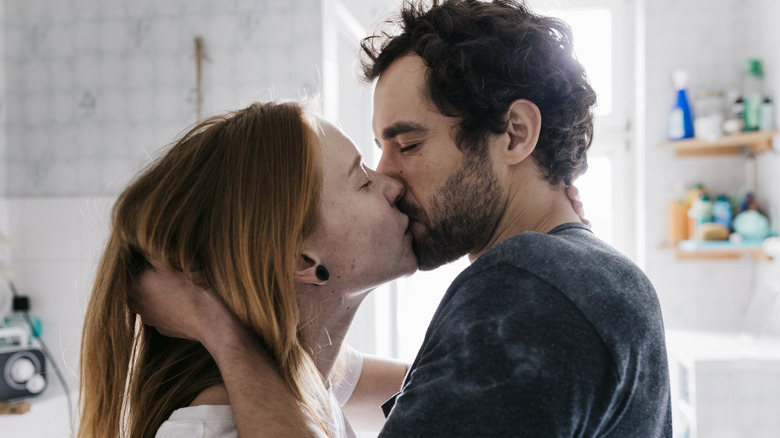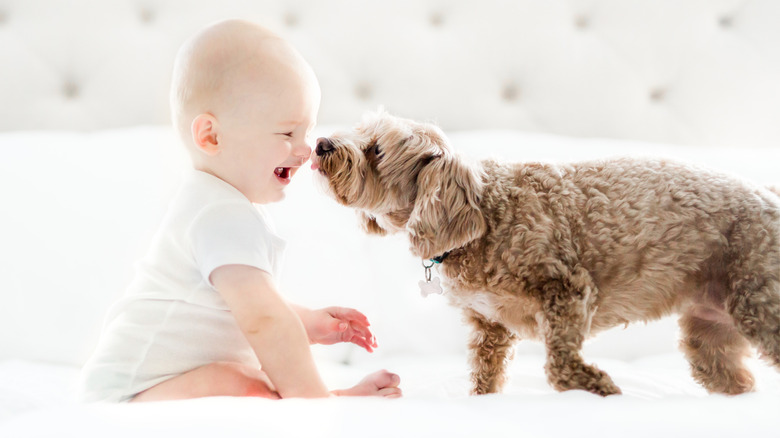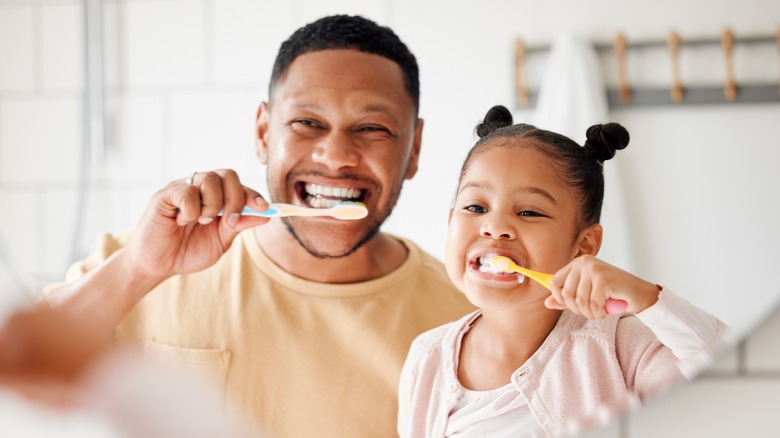Can Kissing Ruin Your Teeth? What Experts Say
How many people did you kiss when the clock struck midnight on New Year's Eve? Your special someone? A couple of people? Maybe more? A few years ago, kissing multiple people at a party probably didn't seem like a big deal, but the COVID-19 pandemic opened our eyes to how easily infections spread. Even though COVID and the flu tend to surge during winter, people have quickly forgotten just how much risk kissing can carry when it comes to getting sick.
It's not just COVID you need to worry about, though. Kissing could also take a toll on your teeth. Your mouth is a major entry point for bacteria, yeasts, and fungi. Katrina Sanders, DMH, explains that these microorganisms can get into your body through your mucosal tissue, saliva, swallowing, or even by being breathed into your lungs. In other words, your mouth is a hotspot for spreading all kinds of germs—including the ones that cause cavities and gum disease (here are some other things about kissing you might not want to know).
"There are incredible research studies that have confirmed that dental cavities and gum disease can be caused by contagious bacteria being spread through activities such as kissing and interestingly, we have found that romantic couples will oftentimes influence each others' microbiome," Sanders said.
Dr. Whitney White, Aspen Dental Dentist & Practice Owner, added that the type of bacteria responsible for causing cavities is Streptococcus mutans. "This bacteria is often introduced into the mouth early in life, and without it, cavities cannot occur," she said.
Your kiss could lead to gum disease
You might want to brush your teeth before kissing someone, especially if you kiss them regularly. "In my clinical practice, I've seen many couples in which one of the partners develops gum disease, then a few months later, the other partner presents with similar findings," Sanders said. Couples who get their annual visits together are often dubious of their diagnoses because the disease appears at the same time.
It's not just couples who kiss one another that could be risking gum disease. Mothers need to keep their oral hygiene in check when kissing their babies. "The number one risk factor for babies getting cavities on their teeth is if their mother has cavities in her mouth because so often when mothers kiss their babies, they are spreading decay-causing bacteria to their baby," Sanders said.
You might also consider who kisses your baby. That Uncle Donald who never goes to the dentist could be giving your baby some of his bacteria. Dogs and cats who kiss babies might make an endearing Instagram reel, but remember what that dog might have licked outside. Sanders says that your pets could influence the microbiome in your mouth.
How to keep your kissing mouth healthy
So, what can you do to reduce this risk? Sanders recommends seeing a dentist regularly and ensuring you're treated for any active oral disease. Your dental hygienist can suggest ways to keep your mouth's immune system strong while preventing the transmission of bacteria to others. "Things to help strengthen your oral immune system, like a healthy diet, stable pH in the mouth, good rest, appropriate breathing habits, and appropriate routine oral hygiene practices at home, are important," she said.
(Read why kissing is better for your health than you realized.)
Even if you're one of those people who love to kiss others to show your affection, you don't have to give that up or start wearing a mask while smooching. Just be sure to take care of your own mouth. Sanders points out that kissing actually has some surprising benefits for your oral health. "Kissing will typically increase saliva flow, and saliva has many antibacterial and healing properties," she said. "Additionally, kissing releases internal chemicals like dopamine, oxytocin, and serotonin which can reduce inflammation and boost immunity." According to White, there are other benefits too. "Saliva also contains minerals like calcium and phosphate, which can help strengthen tooth enamel making it more difficult for cavities to form," she said. Kissing can also help reduce your stress, which may help with teeth grinding. It can also give your partner an added incentive to keep on top of their oral hygiene. "Just make sure both partners maintain good oral hygiene to get all the benefits without sharing harmful bacteria," said White.
So, while there are risks involved, a little extra attention to your oral hygiene can go a long way. With a healthy mouth, you can enjoy those affectionate moments — all while helping protect yourself and others.


